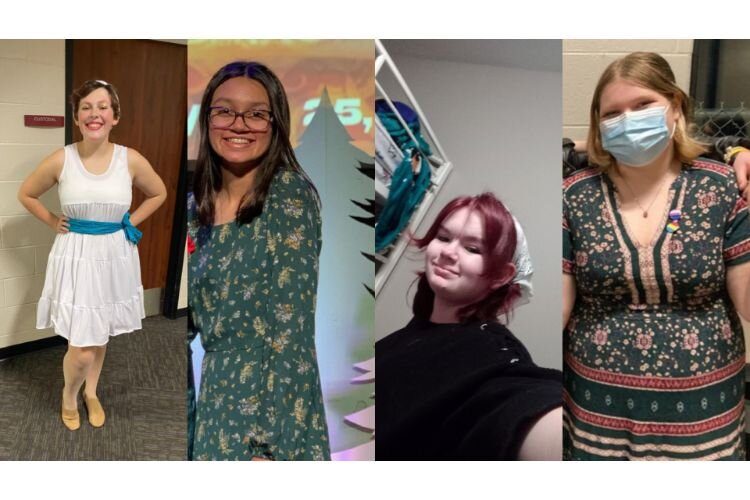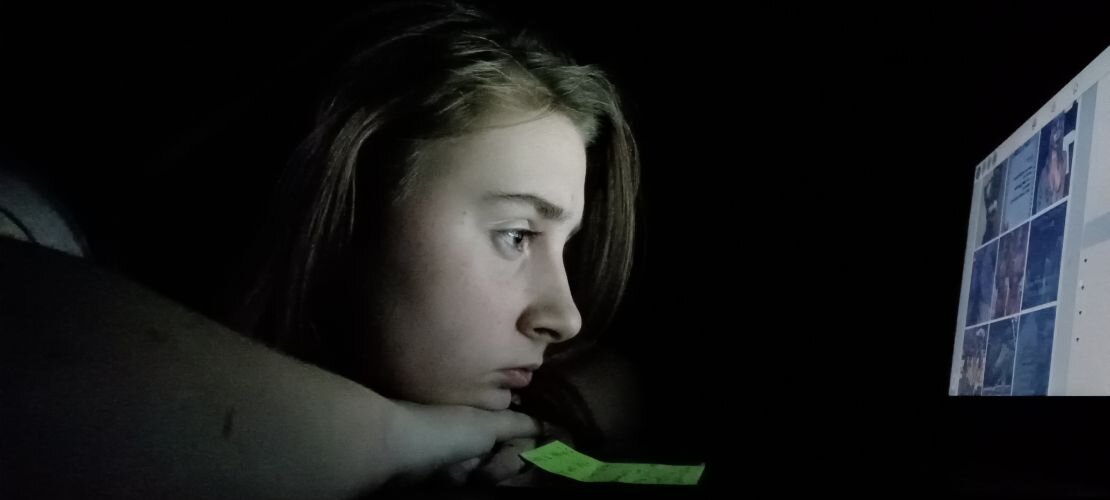Voices of Youth: Battle Creek teen talks with peers about social media’s effect on body image
Numerous studies have demonstrated that social media use can have harmful impacts on teens by causing higher levels of anxiety, body dissatisfaction, and increasing rates of depression. Lila McCarthy, a 13-year-old Voices of Youth Battle Creek writer, examines and editorializes on an issue that she has witnessed first-hand among her peers.
Editor’s Note: This story was written by Lila McCarthy as part of the Battle Creek Voices of Youth Program. Her mentor was Jane Parikh, SWSW’s Battle Creek On the Ground Project Editor. The Voices of Youth Battle Creek Program is produced by Southwest Michigan Second Wave, underwritten by the Kellogg Community Foundation, the City of Battle Creek, the Battle Creek Foundation, and the BINDA Foundation.
Social media is everywhere. From your phone to your work computer, you can pull up all sorts of social media: Facebook, Instagram, Tik Tok, and so many more media platforms. But many people don’t know or don’t acknowledge the harmful side of social media, especially the harm it does to young people concerning their views on their bodies.
“It’s awful,” says Alyssandra Radford, 15, a student at Portage Northern High School. “I had access to social media when I was really young. I wanna’ say I got Instagram when I was ten, I got TikTok when I was ten, before that I had Musical.ly when I was eight, and then it turned into TikTok and Snapchat.”
How is social media to blame for negative views on your body? Well, that’s the question, isn’t it? See, on social media, we are exposed to a lot of things, be it arts and crafts tutorials, lip-syncing, pictures of food, cat videos, or comedic skits. But honestly, one of the most common things to come across while scrolling down any social media platform is idealized bodies. And the idealized body changes by the moment. A lot. One year it can be skinny and fair-skinned, another it can be curvy and dark-skinned.
“I said I got an eating disorder, and at first when I started the recovery I didn’t really think that social media impacted it,” Alyssandra says. “And so, I think during the end of eating disorder recovery therapy, I started to realize: social media’s the problem. And I’m honestly, like, addicted to social media. Which is not good! Like, every day I find myself on TikTok or Instagram almost every hour during the school day.”
Beauty gurus can help you sometimes with a makeup look, but if you find yourself wanting to change things about yourself because of the way you see these people, it can become harmful.
“Every time I went on Social Media and I saw someone that just looked really beautiful with, like, bigger boobs, a slim waist, and just nice thighs, and a butt, I’m like: ‘Okay, well, I wanna look like this person,’” says Alyssandra.
The culprit doesn’t always have to be social media, though. Factors that can also affect our views on our bodies can be actors on television, celebrities, models in advertisements, people around you in your life, and more. Apple Esman, a homeschooled student, age 15, says, “I don’t really have social media, but I think it’s very easy to compare myself to people. I’m always comparing myself to someone, especially celebrities and people who look different than me. And even though in the back of my mind I know that celebrities have thousand-dollar beauty treatments, plastic surgery, and magazine editing, it can still be hard.”
And it is hard! Comparing yourself to someone hurts you. You may not notice it at first, but it hurts. It can lower your confidence, it can make your anxiety pop up more, and it can make your depression more severe.

Comparison is a really common theme in people who have viewed themselves negatively. There’s the constant comparison for so many people who want to look like the people they see on social media, in movies, or in advertisements.
Both Alyssandra and Apple said that they’ve compared themselves to people plenty of times. When asked what kind of comparisons she makes, Apple says, “I think I’d say, like, my size. I tend to compare my size to other people in shows and stuff. And my skin. I know in shows and stuff everything’s really smoothed out and stuff, but I have stretch marks and bumps and stuff like that.”
Alyssandra has a different response to the question, “I would see a lot of things, mostly about, like… just… I don’t even know. Just these… these girls! They would have really nice arms, and these really nice breasts, and an hourglass figure. They had an hourglass figure, and so I was like: ‘I want my legs to be like that. I want my arms to be like that. I want my waist to be like that. I want my face to be like that.’ Like my nose. Because I have a very ethnic nose, and all these girls had their cute little button noses. I wanted that. Like, I thought ‘I’m going to get surgery to have that nose.’ I thought that when I was twelve years old.”

Those who compare themselves to others commonly try to change their appearance to ‘fit in’ or ‘look prettier.’ This can become very unhealthy. It can cause eating disorders like anorexia or bulimia nervosa, or sleep disorders. Social media use can cause anxiety and depression to skyrocket and cause addictions to social media platforms. For some, like Apple, support from others helps them from starting to get unhealthy habits or issues, but for others, like Alyssandra, social media contributed to quite a few issues.
“I got an Eating Disorder. Obviously, I stopped eating,” they said. “I started becoming obsessed with literally everything on social media and became obsessed with social media, period. I would always just open an app, and go on it. I would be on it for hours and hours. And I literally wouldn’t know. I could be on it for seven hours and think I’d been on it for seven minutes. I also have a sleep disorder from that, but it makes my sleep worse.”
Sometimes people don’t realize that habits like these are unhealthy for a very long time. It can take years for someone to realize how hurtful social media is to them. Although Apple didn’t have extreme problems when it came to this, she did express the fact that she always felt guilty for eating, even though it was what her body needed. There are many ways that one can have issues with food and other things when they compare themselves to people. Even when the impact is not as serious as an eating disorder, it can still cause issues of discomfort.
The initial attractions of social media sometimes blind teenagers to its harmful effects. Often teens don’t notice if they are addicted to social media, which can cause disruptions in their lives before they realize what is happening.

Back in September 2021, there was a big court case about the fact that Facebook executives knew the harm they were doing to young people, and Antigone Davis, Facebook’s global head of safety, faced a grilling about it on the 30th of September, 2021. Even worse was the fact that Facebook’s owner seemed to know that Facebook and Instagram were damaging teen girls’ mental health.
Now, I am not trying to cause people to be critical of those who do use social media. I am simply saying that there are so many ways using social media can harm a person. Sure, you can go on social media for an hour or two, but too much is harmful.
In the words of Alyssandra, “You hear me talking about how I hate social media right now like it’s negatively impacting everything. And it’s not a crime to be on social media, it’s not a crime to have social media, you can get on it for an hour or two, but obsessive behavior with it? That’s a no. And as much as you hate to hear it, what do your parents say about staying off your phone? 110% true.”
So please, watch how long you stare at people online, and how long you are on social media. Take breaks. Shut off your phone for a day or two and take some time for yourself. Find a group and compliment each other on things you’re insecure about. Compliment yourself! Find things that make you confident and happy!
What I’m trying to say is this: No matter who you are, you are beautiful. Love yourself and love others around you. Before you make that offhanded remark to someone about their looks, try to think of how it may impact that person. All bodies are beautiful.

Lila McCarthy, 13, is in 9th grade and is homeschooled. “I chose this topic because I felt that it needed a more personal approach and those who have struggled with body image needed to know that they are not alone,” she says.















